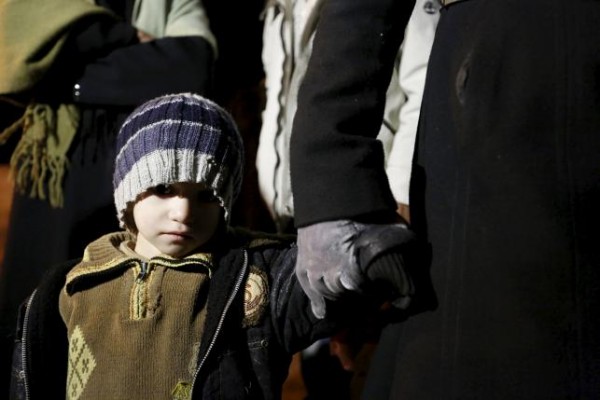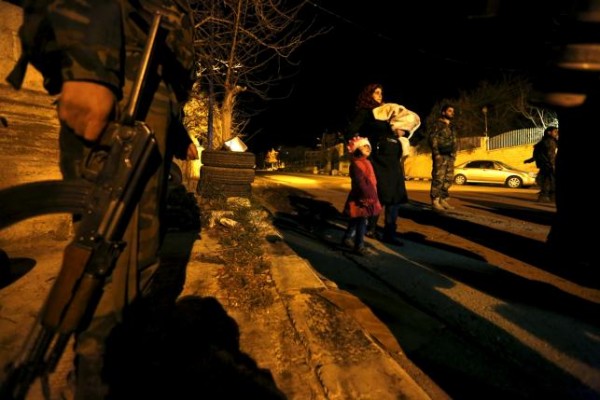
Residents of a besieged Syrian town have told U.N. investigators how the weakest in their midst, deprived of food and medicines in violation of international law, are suffering starvation and death, the top U.N. war crimes investigator told Reuters on Tuesday.
An aid convoy on Monday brought the first food and medical relief for three months to the western town of Madaya, where 40,000 people are trapped by encircling government forces.
Another United Nations official who oversaw the aid delivery described on Tuesday how he saw malnourished residents, particularly children, some of whom were little more than skeletons and barely moving.
The U.N. commission of inquiry documenting war crimes in Syria has been in direct contact with residents inside Madaya, the commission’s chairman Paulo Pinheiro said in an emailed reply to Reuters questions.
“They have provided detailed information on shortages of food, water, qualified physicians, and medicine. This has led to acute malnutrition and deaths among vulnerable groups in the town.” he said in the email sent from his native Brazil.
The U.N. inquiry, composed of independent experts, has long denounced use of starvation by both sides in the Syrian conflict as a weapon of war, and has a confidential list of suspected war criminals and units from all sides which is kept in a U.N. safe in Geneva.
“Siege tactics, by their nature, target the civilian population by subjecting them to starvation, denial of basic essential services and medicines,” Pinheiro said on Tuesday.
 “Such methods of warfare are prohibited under international humanitarian law and violate core human rights obligations with regard to the rights to adequate food, health and the right to life, not to mention the special duty of care owed to the well-being of children.”
“Such methods of warfare are prohibited under international humanitarian law and violate core human rights obligations with regard to the rights to adequate food, health and the right to life, not to mention the special duty of care owed to the well-being of children.”
Rebel forces are also besieging the government-held villages of Foua and Kafraya in Idlib province, where U.N. supplies were also delivered on Monday, Pinheiro noted. Islamic State fighters are besieging government-held areas of Deir al-Zor, he added.
MANY MORE MAY DIE
Yacoub El Hillo, the U.N. resident and humanitarian coordinator in Syria, told of heartbreaking scenes when the aid convoy made it to Madaya on Monday.
“We saw people who are clearly malnourished, especially children, we saw people who are extremely thin, skeletons, that are now barely moving,” he told reporters in New York by phone from Damascus, saying all sides in the civil war were using siege as a tactic of war.
“We saw people that are desperate, people that are cold, people that angry, people that have almost lost hope that the world cares about their plight,” he said. “Many more will die if the world does not move faster.”
Other aid workers witnessed similar scenes. “It’s really heartbreaking to see the situation of the people,” said Pawel Krzysiek of the International Committee of the Red Cross. “A while ago I was just approached by a little girl and her first question was did you bring food … we are really hungry.”
The World Health Organization said it had asked the Syrian government to allow it to send mobile clinics and medical teams to Madaya to assess the extent of malnutrition and evacuate the worst cases.
A local doctor said 300 to 400 people needed special medical care, according to Elizabeth Hoff, the WHO representative in Damascus who went into Madaya with the convoy.
“You could see many were malnourished, starving. They were skinny, tired, severely distressed. There was no smile on anybody’s face,” she told Reuters by telephone from Damascus. “The children I talked to said they had no strength to play.”
FOOD WEAPON CONDEMNED
Western diplomats have also condemned the use of food as a weapon of war, with the U.S. ambassador to the United Nations, Samantha Power, accusing the government of Syrian President Bashar al-Assad of “grotesque starve-or-surrender tactics”.
Britain’s U.N. ambassador, Matthew Rycroft, said “wilfully impeding relief supply and access can constitute a violation of international humanitarian law”.
Legal experts said that could be construed as either a war crime or a crime against humanity, or both.
However, there appears little immediate prospect of such a case being brought before the international war crimes tribunal in The Hague, since Syria is not a member and any referral to the court by the U.N. Security Council would have to overcome Russian reluctance.
The difficulties in getting aid into Madaya and other besieged places could also set back efforts to hold new peace talks on the five-year-old war in Syria, scheduled to take place under U.N. auspices in Geneva on Jan. 25.
A U.N. road map for the talks calls on the parties to allow aid agencies unhindered access throughout Syria, particularly in besieged and hard-to-reach areas.
An opposition grouping has told the U.N. that this must happen before the talks can begin, lending weight to suggestions that the humanitarian situation could make Jan. 25 a hard target to hit.
The U.N. Special Envoy for Syria Staffan de Mistura will meet senior U.S. and Russian envoys in Geneva on Wednesday and later ambassadors from all five permanent members of the Security Council.
Negotiations to get into Madaya and the other two villages near Idlib were lengthy and difficult. There are presently about 15 siege locations in Syria, where 450,000 people are trapped, the United Nations says.
The main opposition coordinator, Riad Hijab, said the United States had backtracked over the departure of Assad as part of any settlement and this meant the opposition would face hard choices on whether to attend the talks.
The WHO intends to return to Madaya on Thursday as part of a U.N. convoy with more medical and food supplies, Hoff said.
ICRC spokeswoman Dibeh Fakhr also said its next distribution is planned for Thursday. The aid consists of blankets and medicine as well as food.
REUTERS

Leave a Reply
You must be logged in to post a comment.